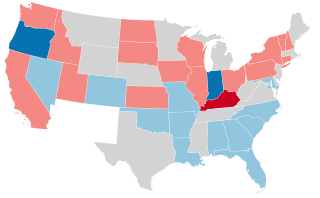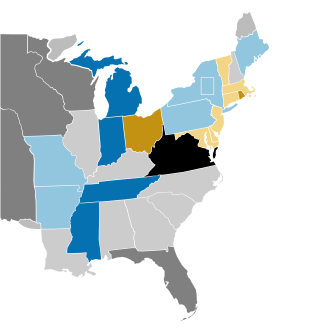The 1797 United States Senate election in Pennsylvania was held on February 16, 1797. Incumbent James Ross was re-elected by the Pennsylvania General Assembly to the United States Senate. [1]
| Elections in Pennsylvania |
|---|
 |
The 1797 United States Senate election in Pennsylvania was held on February 16, 1797. Incumbent James Ross was re-elected by the Pennsylvania General Assembly to the United States Senate. [1]
After Sen. Albert Gallatin was removed from office after his eligibility was successfully challenged, James Ross was elected by the General Assembly, consisting of the Pennsylvania House of Representatives and Pennsylvania State Senate, in 1794 to fill the remainder of the unexpired term, which was to expire on March 4, 1797. [2]
The Pennsylvania General Assembly convened on February 16, 1797, to elect a Senator to fill the term beginning on March 4, 1797. The results of the vote of both houses combined are as follows:
| Party | Candidate | Votes | % | |
|---|---|---|---|---|
| Federalist | James Ross (Inc.) | 56 | 54.90 | |
| Democratic-Republican | William Irvine | 38 | 37.25 | |
| N/A | Not voting | 8 | 7.84 | |
| Total votes | 102 | 100.00 | ||

The 1908–09 United States Senate elections were held on various dates in various states. As these U.S. Senate elections were prior to the ratification of the Seventeenth Amendment in 1913, senators were primarily chosen by state legislatures. Senators were elected over a wide range of time throughout 1906 and 1907, and a seat may have been filled months late or remained vacant due to legislative deadlock. However, some states had already begun direct elections during this time. Oregon pioneered direct election and experimented with different measures over several years until it succeeded in 1907. Soon after, Nebraska followed suit and laid the foundation for other states to adopt measures reflecting the people's will. By 1912, as many as 29 states elected senators either as nominees of their party's primary or in conjunction with a general election.

The 1844–45 United States Senate elections were held on various dates in various states, coinciding with James K. Polk's election. As these U.S. Senate elections were prior to the ratification of the Seventeenth Amendment in 1913, senators were chosen by state legislatures. Senators were elected over a wide range of time throughout 1844 and 1845, and a seat may have been filled months late or remained vacant due to legislative deadlock. In these elections, terms were up for the senators in Class 1.

The 1794–95 United States Senate elections were held on various dates in various states. As these U.S. Senate elections were prior to the ratification of the Seventeenth Amendment in 1913, senators were chosen by state legislatures. Senators were elected over a wide range of time throughout 1794 and 1795, and a seat may have been filled months late or remained vacant due to legislative deadlock. In these elections, terms were up for the senators in Class 3.

The 1860–61 United States Senate elections were held on various dates in various states. As these U.S. Senate elections were prior to the ratification of the Seventeenth Amendment in 1913, senators were chosen by state legislatures. Senators were elected over a wide range of time throughout 1860 and 1861, and a seat may have been filled months late or remained vacant due to legislative deadlock. In these elections, terms were up for the senators in Class 3.

The 1793 United States Senate special election in Pennsylvania was held on February 28, 1793. Albert Gallatin was elected by the Pennsylvania General Assembly to the United States Senate.

The 1794 United States Senate special election in Pennsylvania was held on March 31, 1794. James Ross was elected by the Pennsylvania General Assembly to the United States Senate.

The 1802 United States Senate election in Pennsylvania was held on December 14, 1802. Samuel Maclay was elected by the Pennsylvania General Assembly to the United States Senate.

The 1808 United States Senate election in Pennsylvania was held on December 13, 1808. Michael Leib was elected by the Pennsylvania General Assembly to the United States Senate.

The 1814 United States Senate special election in Pennsylvania was held February 24, 1814. Jonathan Roberts was elected by the Pennsylvania General Assembly to the United States Senate.

The 1814 United States Senate election in Pennsylvania was held on December 10, 1814. Incumbent Jonathan Roberts was elected by the Pennsylvania General Assembly to the United States Senate.

The 1820–1821 United States Senate election in Pennsylvania was held on three separate dates from December 1820 to December 1821. On December 10, 1821, William Findlay was elected by the Pennsylvania General Assembly to the United States Senate.

The 1909 United States Senate special election in Pennsylvania was held on March 16, 1909. George T. Oliver was elected by the Pennsylvania General Assembly to the United States Senate.

The 1795 United States Senate election in Pennsylvania was held on February 26, 1795. William Bingham was elected by the Pennsylvania General Assembly to the United States Senate.

The 1806 United States Senate election in Pennsylvania was held from December 9 to 16, 1806. Andrew Gregg was elected by the Pennsylvania General Assembly to the United States Senate.

The 1830 United States Senate election in Pennsylvania was held on from December 14 to 16, 1830. William Wilkins was elected by the Pennsylvania General Assembly to the United States Senate.

The 1843 United States Senate election in Pennsylvania was held on January 10, 1843. Future President of the United States James Buchanan was re-elected by the Pennsylvania General Assembly to the United States Senate.

The 1845 United States Senate special election in Pennsylvania was held on March 13, 1845. Simon Cameron was elected by the Pennsylvania General Assembly to the United States Senate.

The 1849 United States Senate election in Pennsylvania was held on January 10, 1849. James Cooper was elected by the Pennsylvania General Assembly to the United States Senate.

The 1873 United States Senate election in Pennsylvania was held on January 21, 1873. Simon Cameron was re-elected by the Pennsylvania General Assembly to the United States Senate.

The 1877 United States Senate special election in Pennsylvania was held on March 20, 1877. J. Donald Cameron was elected by the Pennsylvania General Assembly to the United States Senate.